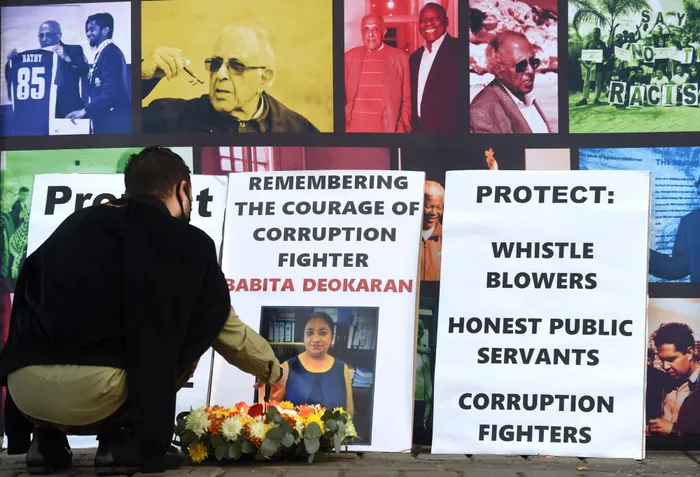Ramaphosa must act on promise

Picture: Itumeleng English/African News Agency (ANA) – Friends and colleagues attended candlelight vigil on August 26, 2021, in Johannesburg, South Africa, for murdered Gauteng Health chief director Babita Deokaran, who was shot dead outside her home on Monday. The killings and threats have not ceased, and President Cyril Ramaphosa, during his State of the Nation addresses in 2022 and 2023, correctly pointed out that there was a need for greater protection of whistleblowers in the country, the writer says.
By Shenilla Mohamed
The Global Initiative Against Transnational Organised Crime identified a total of 1,971 assassination cases in South Africa between 2000 and 2021.
Many of those targeted and killed were whistleblowers and human rights defenders who had exposed corruption and stood up for the human rights of their communities, as well as all the people in South Africa.
The killings and threats have not ceased, and President Cyril Ramaphosa, during his State of the Nation addresses in 2022 and 2023, correctly pointed out that there was a need for greater protection of whistleblowers in the country.
He said the government was working to capacitate its witness protection unit and would introduce amendments to the Protected Disclosures Act and the Witness Protection Act to better protect informers.
But the time for talk is over. Immediate action is needed. Lives depend on it. Whistleblowers and human rights defenders are critical in the fight against corruption and accountability. They expose acts of criminality and abuse by governments, corporations, organisations, and individuals. Without whistleblowers and human rights defenders, evidence of large-scale human rights violations would never surface.
While the country has robust laws designed to protect whistleblowers, including the Protected Disclosures Act and the Witness Protection Act, gaps in the legislative framework, and problems with the practical implementation of these mechanisms, prevent them from being effective. This was evident in the case of Babita Deokaran, who was shot dead outside her home in 2021.
Deokaran was the chief director of financial accounting at the Gauteng Department of Health. Prior to her death, she had exposed corruption in the procurement of Covid-19 personal protective equipment. The government failed to provide her with security, and she was brutally killed. In January 2022.
Another whistleblower, Athol Williams, fled the country believing his life was in danger. He had just testified before the Judicial Commission of Inquiry into Allegations of State Capture, Corruption and Fraud in the Public Sector, including Organs of State (the Zondo Commission). He claimed he had asked the state for protection but had not received any.
Patricia Mashale is a suspended senior SAPS administrator in the Free State. She claims her life is under threat after she reported corruption and other crimes taking place within the SAPS. Mashale has been in hiding since February last year.
In 2018, Amnesty International SA began looking into reports of an assassination plot against two Amadiba Crisis Committee activists, Nonhle Mbuthuma and Twesha Silangwe, who are fighting for the land, environmental and human rights of their community in the Eastern Cape. The chairperson of the committee, Sikhosiphi “Bazooka” Rhadebe, was shot dead in 2016. No one has been brought to justice for his murder.
Amnesty ran a global campaign calling on the South African government to investigate Rhadebe’s murder. It urged the SAPS to take all necessary measures to ensure the members of the committee could carry out their legitimate work of defending human rights in safety, without fear of harass ment or attack, and to investigate the death threats against the committee’s leadership. In 2020, environmental activist and human rights defender Fikile Ntshangase was silenced with six bullets.
He was part of the Somkhele community, which lives near the Tendele coal mine owned by Tendele Coal Mine (Pty) Ltd, a subsidiary of Petmin. As vice-chairperson of a subcommittee of the iMfolozi Community Environment Justice Organisation, a community-based organisation advocating for environmental justice in the area, she was a vocal opponent of the open coal mine and its expansion of mining operations in the area.
Amnesty is fighting for justice for Ntshangase who was unprotected and died. Deokaran was unprotected and died. Rhadebe was unprotected and died. Mbuthuma, Silangwe, Williams, and Mashale remain unprotected and fear for their lives.
In 2022, Amnesty’s committee to protect journalists, Media Monitoring Africa, the SA National Editors’ Forum, and the Campaign for Free Expression made a submission to South Africa’s four-yearly universal periodic review at the UN.
In the submission, we called on the government to:
* Review the Protected Disclosures Act to strengthen the protection of whistle-blowers, including with respect to reporting mechanisms for these individuals.
* Establish transparent oversight mechanisms to ensure that this protection is properly received and that the public is reassured that it is received.
* Allocate resources for the protection of whistle-blowers and ensure that these are clearly accounted for in line with the Public Finances Management Act.
* Adequately fund the auditor-general and the public protector to ensure they have the capacity to properly fulfil their duties in respecting and protecting whistle-blowers.
We stand by these calls. The government is obliged to provide whistleblowers with protection, and Ramaphosa and his government must transparently and without delay outline how they plan to strengthen protection for whistleblowers and human rights defenders.
The country, whistleblowers and human rights defenders cannot wait until the next Sona for more talk. Whistleblowers need to be assured that exposing corruption and wrongdoing will not cost them their lives. This is a life-and-death issue. Ramaphosa made a promise in his 2022 and 2023 State of the Nation addresses, and he must act on this promise.
Mohamed is the executive director of Amnesty International SA